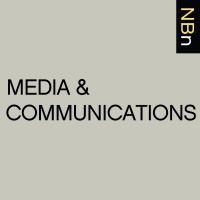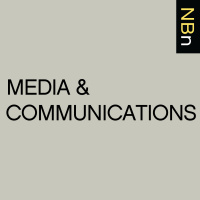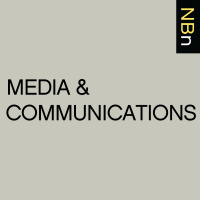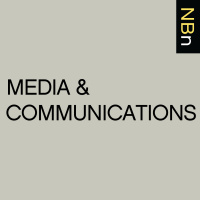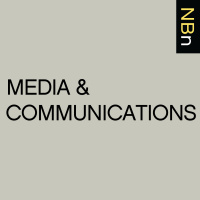Synopsis
Interviews with Scholars of Media and Communications about their New Books
Episodes
-
Cass Sunstein, “The World According to Star Wars” (Harper Collins, 2016)
28/05/2016 Duration: 34minCass Sunstein‘s son, Declan, got dad hooked on Star Wars. And dad, a Harvard Law professor, ended up writing a book about it. “If you’d told me a year ago that I’d write a book about Star Wars,” Sunstein recently told the Boston Globe,“I’d say it’s more likely that I’d become an astronaut or a poet.” In The World According to Star Wars (Harper Collins, 2016) Sunstein explores its lessons as they relate to childhood, fathers, the Dark Side and redemption. Calling it our Modern Myth, Sunstein says Star Wars also has a lot to teach us about constitutional law, economics, and political uprisings. From those topics, it answers questions like these. No one predicted the film’s massive success so how did it happen? When Star Wars heroes are told they are free to choose, what does that mean in their epic story world? What does it say about our never-ending ability to make the right decision when the chips are down in our real one? How are constitutional law opinions similar to serialized blockbusters? An intelligent
-
Sahana Udupa, “Making News in Global India: Media, Publics, Politics” (Cambridge UP, 2015)
19/05/2016 Duration: 01h30sWhat role does Bangalore’s private news culture play in shaping the southern Indian metropolis’ ongoing urban transformation? Sahana Udupa‘s new book Making News in Global India: Media, Publics, Politics (Cambridge University Press, 2015) answers this question through a fascinating and fine grained ethnography of the city’s bi-lingual news media. Exploring differences amongst the English language and local language press, class-based civic activism, novelties in news room practices and layers of journalistic identities the book shows the ways in which a certain type of aspiration that has come to characterize some news outlets, conflicts and contends with the visibility of local urban cultures and the struggle for dominance amongst different actors in the news field. Learn more about your ad choices. Visit megaphone.fm/adchoices
-
Bernard Harcourt, “Exposed: Desire and Disobedience in the Digital Age” (Harvard UP, 2015)
17/05/2016 Duration: 01h10minThe landscape described in Bernard Harcourt‘s new book is a dystopia saturated by pleasure. We do not live in a drab Orwellian world, he writes. We live in a beautiful, colorful, stimulating, digital world a rich, bright world full of passion and jouissance–and by means of which we reveal ourselves and make ourselves virtually transparent to surveillance. Exposed: Desire and Disobedience in the Digital Age (Harvard University Press, 2015) guides us through our new digital age, one that makes it so easy for others to monitor, profile, and shape our every desire. We are building what he calls the expository society a platform for unprecedented levels of exhibition, watching, and influence that is reconfiguring our political relations and reshaping our notions of what it means to be an individual. Other actors from advertisers to government agencies can compile huge amounts of information about who we are and what we do. Whether they use it to recommend other products to buy or track our movements, Harcourt ar
-
Joshua Braun, “This Program is Brought to You By . . . Distributing Television Online” (Yale UP, 2015)
07/05/2016 Duration: 01h03min“One of the things that was most shocking to me getting into the media business, an MSNBC.com producer tells Josh Braun, was the realization that regular people were making it. Television to me . . . was just like sunlight. You push the button and it just comes off the screen. Today, television just comes off lots of screens. Computers, tablets, phones, city billboards, stadium jumbotrons. The path from the recording pictures to showing them to us their physical distribution is neither simple nor elegantly planned. In This Program is Brought to You By . . . Distributing Television Online (Yale University Press 2015), Joshua Braun, an Assistant Professor of Journalism Studies in the Journalism Department at University of Massachusetts-Amherst, explores changes in the technology platforms for online news at MSNBC between 2007 and 2012. A book of media sociology, Braun uses a series of examples at MSNBC such as a more flexible video player, online community forums, and a blog for the Rachel Maddow Show, to make
-
Mark Carrigan, “Social Media for Academics” (Sage, 2016)
27/04/2016 Duration: 42minHow can academics respond to the rise of social media? Or should they respond at all? In Social Media for Academics (Sage, 2016), Mark Carrigan, from the Centre for Social Ontology, offers an informed and reflective take on social media, with some practical guidelines for academics. The book introduces key concepts, such as digital scholarship, social media and ‘the public’, alongside discussions of specific platforms including twitter (Mark himself tweets @mark_carrigan). The book is not only a guide for academics who are interested in social media, as it considers the impact of new media forms on scholarship itself, with considerations of academic identities, academic networks and relationships, as well as the benefits and risks of embracing social media.The book is essential reading for any academic seeking an informed understanding of both the ‘how to’ and, perhaps more importantly, the ‘why’ and ‘what’ of social media for academics. Dave O’Brien is the host of New Books In Critical Theory and is a Sen
-
Seth Jacobowitz, “Writing Technology in Meiji Japan” (Harvard UP, 2015)
26/04/2016 Duration: 01h10minSeth Jacobowitzs new book opens with a balloon ride and closes with a record-scratching cat, and in between it offers a fascinating history of Meiji media focused on technologies of writing and script. Inspired, in part, by the work of Friedrich Kittler, Writing Technology in Meiji Japan: A Media History of Modern Japanese Literature and Visual Culture (Harvard University Asia Center, 2015) traces the story of shorthand in Japan. First introduced for recording political speeches and the conduct of the state, by the mid-1880s shorthand was used to transcribe popular theatrical storytelling and enabled a kind of unvarnished vernacular writing that was the forerunner of genbun itchi, the unification of speech and writing, or the unified style. Its history interweaves in important ways with the histories of standardization movements, script reform, the rise of communications systems like telegraphy and the postal system, and the development of new literary styles of realism. (Also, in case you missed it above: th
-
Alejandra Dubcovsky, “Informed Power: Communication in the Early American South” (Harvard UP, 2016)
26/04/2016 Duration: 43minInformed Power: Communication in the Early American South (Harvard University Press, 2016) maps the intricate, intersecting channels of information exchange in the early American South, exploring how people in the colonial world came into possession of vital knowledge in a region that lacked a regular mail system or a printing press until the 1730s. Challenging the notion of early colonial America as an uninformed backwater, Alejandra Dubcovsky uncovers the ingenious ways its inhabitants acquired timely news through largely oral networks. Information circulated through the region via spies, scouts, traders, missionaries, and other ad hoc couriers and by encounters of sheer chance with hunting parties, shipwrecked sailors, captured soldiers, or fugitive slaves. For many, content was often inseparable from the paths taken and the alliances involved in acquiring it. The different and innovative ways that Indians, Africans, and Europeans struggled to make sense of their world created communication networks that
-
Jason Mittell, “Complex TV: The Poetics of Contemporary Television” (NYU Press 2015)
18/04/2016 Duration: 01h06minWe are said to be in a golden age of TV. The best stories today are told on television screens in serialized forms. The Wire, Lost, Breaking Bad, The Sopranos are a few of the shows that have elevated the cache of television, introducing riskier forms of storytelling in a medium that has been typically formulaic and convention bound. Fans and critics alike celebrate them for innovation and television networks are filled programming with more and more of them. In Complex TV: The Poetics of Contemporary Television (NYU Press 2015), is film and television scholar Jason Mittell of Middlebury College offers a sustained analysis of the poetics of television narrative, focusing on how storytelling has changed in recent years and how viewers make sense of these innovations. Complex television, Mittell says, is not a genre. It is a storytelling mode and set of associated production and reception practices that span a wide range of programs across an array of genres. Through close analyses of key programs, includingTh
-
Benjamin Castleman, “The 160-Character Solution: How Text Messaging and Other Behavioral Strategies Can Improve Education” (Johns Hopkins UP, 2015)
03/04/2016 Duration: 58minTeenagers live in their phones. As an educator you can try to pull them away or meet them where they are. The 160-Character Solution: How Text Messaging and Other Behavioral Strategies Can Improve Education (Johns Hopkins University Press, 2015) urges educators to meet teens on their must-have device. Author Benjamin Castleman of the University of Virginia shows how text messaging combined with insights from behavioral science―more specifically the fields of behavioral economics and social psychology―can be leveraged to help students complete assignments, perform to their full potential on tests, and choose schools and colleges where they are well positioned for success. In his own research, Castleman has studied how to use personalized text messages to reduce “summer melt,” in which up to 40 percent of high school graduates who have been accepted to college, mostly from underserved communities, fail to show up for the fall semester. Behavioral strategies extend beyond texting and even beyond smartphon
-
Jonathan Donner, “After Access: Inclusion, Development, and a More Mobile Internet” (MIT Press, 2015)
14/03/2016 Duration: 01h05minThanks to mobile phones, getting online is easier and cheaper than ever. In After Access: Inclusion, Development, and a More Mobile Internet (MIT Press, 2015), Jonathan Donner challenges the optimistic narrative that mobile phone will finally close the digital divide. How we log on, how long we stay, what we choose to do, what we can do – all are shaped by our environments, resources and digital literacies. After Access examines the implications of the shift to a more mobile, more available Internet throughout the developing world. Donner addresses these implications specifically for socioeconomic development and broad-based inclusion in a global society. He offers a note of caution about the Panglossian views of mobile phones arguing that access and effective use are not the same thing, and the digital world does not run on mobile handsets alone. Donner, a Senior Director of Research at Caribou Digital, a UK-based consultancy focused on building inclusive digital economies in the developing world. After Acc
-
Fowler, Franz, and Ridout, “Political Advertising in the United States” (Westview Press, 2016)
14/03/2016 Duration: 24minErika Franklin Fowler, Michael M. Franz, and Travis N. Ridout are the co-authors of Political Advertising in the United States (Westview Press 2016). Fowler is assistant professor of government at Wesleyan University, Franz is associate professor of government and legal studies at Bowdoin College, and Ridout is Thomas S. Foley Distinguished Professor of Government and Public Policy in the School of Politics, Philosophy, and Public Affairs at Washington State University. The authors, co-directors of the Wesleyan Media Project, draw from the latest data to analyze how campaign finance laws have affected the sponsorship and content of political advertising and how the Internet has changed the distribution of ads. With detailed analysis of presidential and congressional campaign ads and discussion questions in each chapter, Political Advertising provides an ideal explainer for students, scholars and practitioners who want to understand the ins and outs of political advertising. Learn more about your ad choices.
-
David R. Brake, “Sharing our Lives Online: Risks and Exposure in Social Media” (Palgrave Macmillan, 2014)
29/02/2016 Duration: 46minWith the growth of social media like Facebook, Twitter, Instagram, and Snapchat, we are increasingly heading toward a radically open society. In Sharing our Lives Online: Risks and Exposure in Social Media (Palgrave Macmillan, 2014), author David R. Brake explores some of the social and individual harms that can arise from unwary social media use. Brake draws upon in-depth interviews with bloggers as well as scholarly research to explore why users may inadvertently reveal more online than they suppose. He explains in detail the social, technological, and commercial influences and pressures that keep us posting what we often shouldn’t and that prevent us from fully appreciating the risks when we do so. Learn more about your ad choices. Visit megaphone.fm/adchoices
-
Jeffery Pomerantz, “Metadata” (MIT, 2015)
22/02/2016 Duration: 43minWhat is the “stuff” that fuels the information society in which we live? In his new book, Metadata (MIT 2015), information scientist Jeffrey Pomerantz asserts that metadata powers our digital society. After defining metadata-data that has the potential to provide information about an object-Pomerantz considers the various kind of metadata. This raw material provides descriptions about individuals and most every other thing in the world. This data allows people, places, and things to be found. According to Pomerantz, metadata has become infrastructural as it plays such a pivotal role about in all of the things we do, yet, it is invisible. This invisible foundational material is created and collected all the time, and has vast implications for governments, corporations, and individuals. Learn more about your ad choices. Visit megaphone.fm/adchoices
-
Finn Brunton, “Spam: A Shadow History of the Internet” (MIT Press, 2013)
16/02/2016 Duration: 59minFinn Brunton‘s Spam: A Shadow History of the Internet (MIT Press, 2013) is a cultural history of those communications that seek to capture our attention for the purposes of exploiting it. From pranks on early computer networks in the 1970s to commercial nuisances in the 1990s to the global criminal infrastructure of today driven by botnets and algorithms, spam’s history surfaces and shifts with the Internet itself. Spam is a lively book packed with tales of the people responsible for sharing and stopping spam’s myriad of forms in email, web sites and social networks. This includes everyone from programmers and security professionals, marketers and lawyers, and con artists and thieves to name a few. Each person has personal experiences with spam and opinions about when they’re being spammed, but Brunton, a professor at New York University, reminds us about the critical role that communities, organizations, and governments have played in regulating spam. Ultimately, the governance agreed to by these groups def
-
Barry Brown and Oskar Juhlin, “Enjoying Machines” (MIT 2015)
06/01/2016 Duration: 34minWhen we consider the television, we think not only about how it’s used, but also it’s impact on culture. The television, tv, telly, or tube, became popular in the West in the late 1940s and early 1950s and was seen as a form of entertainment and enjoyment for the family. Other “technology” that assists with leisure include things like rubber-soled shoes, books, and other digital devices. In their new book, Enjoying Machines (MIT 2015), Barry Brown and Oskar Juhlin, both scholars in the Stockholm University Mobile Life VINN Excellence Center, the success of a particular technology can be measured by how well it creates pleasure. The authors argue that pleasure “is fundamentally social in nature,” and that to understand how technology supports leisure it is important to “produce a more sophisticated definition” of enjoyment. To do this Brown and Juhlin embark on an ethnographic investigation of technology and enjoyment that combines the sociological study of activity and the study of human-machine interaction.
-
Peter J. Gloviczki, “Journalism and Memorialization in the Age of Social Media” (Palgrave MacMillan, 2015)
30/12/2015 Duration: 33minHumans have coped with tragedy using ritual and memorials since the Neolithic era. Doka called a memorial a space invested with meaning, “set aside to commemorate an event such as a tragedy.” Memorialization is a ritual of bereavement, the creation of a place, permanent or not, that facilitates the persistence of memory. This space allows for the restructuring of the social network between the living, those who create the memorial, and the dead, those for which the memorial is created. Memorialization happens in both the analog and digital contexts. In fact, some now decline to recognize a distinction between the on- and offline worlds. In his new book, Journalism and Memorialization in the Age of Social Media (Palgrave MacMillan, 2015), Peter J. Gloviczki, an assistant professor at Coker College, conceptualizes online memorials as networked remembrance spaces. These social media posts and groups are “immediate, interactive and public and they function across a great distance.” Online memorials are both user
-
Megan Prelinger, “Inside the Machine: Art and Invention in the Electronic Age” (Norton, 2015)
19/11/2015 Duration: 01h09minMegan Prelinger‘s beautiful new book brings together the histories of technology and visuality to ask the question, “What cultural history of electronics can be extrapolated from a close look at the associated graphic art?” Inside the Machine: Art and Invention in the Electronic Age (W. W. Norton, 2015) treats the commercial and advertising art of the mid-twentieth century as an archive to explore the social and cultural engagement with electronics technologies during a particularly vibrant moment for the American graphic commercial arts. Incorporating text and image as sources to be read, Prelinger’s book moves from the beginnings of FM technology and vacuum tubes, to televisions and quartz crystals, to transistors and circuit boards, to digital computing and into space. Of special interest is the attention Prelinger pays to to the importance of graphic designers and staff artists at major labs and research centers. The book models an innovative and inspiring way to read graphic images as historical document
-
Jerome Bourdon, “Histoire de la television sous de Gaulle” (Presses des Mines, 2014)
17/11/2015 Duration: 01h13sJerome de Bourdon‘s Histoire de la television sous de Gaulle (Presses des Mines, 2014) is a revised version of a book that first appeared in 1990. This edition has been revamped, and includes a new introduction in which Bourdon explores the historiography of the medium in the years since the book’s original publication. A history of television that is also a history of the De Gaulle presidency and the early years of the Fifth Republic, Histoire de la television sous de Gaulle examines a range of issues, from government legislation to programming and content, to the variety of personnel (directors, producers, technicians, administrators) who made television happen during this “era of professionalization.” Exploring the medium as both information and entertainment, the book considers the relationship between television and the cinema, situating television within the broader cultural and political history of France during this critical period. Covering key events and turning points, including the introduction of
-
John Durham Peters, “The Marvelous Clouds: Toward a Philosophy of Elemental Media” (U of Chicago Press, 2015)
17/11/2015 Duration: 01h04minJohn Durham Peters‘ wonderful new book is a brilliant and beautifully-written consideration of natural environments as subjects for media studies. Accessible and informative for a broad readership. The Marvelous Clouds: Toward a Philosophy of Elemental Media (University of Chicago Press, 2015) is structured as a series of meditations on and explorations of water, fire, air, earth, and ether media. After a chapter that sets out some of the foundational ideas shaping the book and charts an intellectual landscape for rethinking media, each of the following chapters offers a carefully curated series of studies of particulars – dolphin jaws, candles, towers, watches, clouds, feet, bells, weathermen, Google, and more – as a means of examining the significance of infrastructure, forgetting, technicity, and other modes of understanding media. Peters asks us to come with a fresh perspective to notions that we otherwise take for granted, and the result is a thoughtful and inspiring account that brings together media s
-
Eric T. Meyer and Ralph Schroeder, “Knowledge Machines: Digital Transformations of the Sciences and Humanities” (MIT Press, 2015)
15/11/2015 Duration: 38minBy now it is incontrovertible that new technology has had an effect on how regular people get information. Whether in the form of an online newspaper or a Google search, new technology has allowed individuals to access masses of information faster than ever before. What, then, has been the effect of digital tools on research practices? In their new book Knowledge Machines: Digital Transformations of the Sciences and Humanities (MIT Press, 2015), Eric T. Meyer, Associate Professor and Senior Research Fellow at the Oxford Internet Institute, and Ralph Schroeder, Professor at the Oxford Internet Institute, explore how digital tools have transformed research. To do this, Meyer and Schroeder use case studies to examine how new technology has, and continues to, change research in various fields, and what this means for the future of e-research. Learn more about your ad choices. Visit megaphone.fm/adchoices



